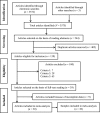The association between muscle dysmorphia and eating disorder symptomatology: A systematic review and meta-analysis
- PMID: 31505966
- PMCID: PMC7044626
- DOI: 10.1556/2006.8.2019.44
The association between muscle dysmorphia and eating disorder symptomatology: A systematic review and meta-analysis
Abstract
Background and aims: Research shows inconsistent findings about the link between muscle dysmorphia (MD) and eating disorder (ED) symptomatology. The aim of this study is to synthesize the scientific evidence available on this topic, the researchers conducted a systematic review and meta-analysis.
Methods: The literature search enabled us to identify 39 published articles, which provided 36 independent estimations of the correlation between the two variables.
Results: Our analysis found a positive association between MD and ED symptoms (r+ = .36; 95% CI = 0.30, 0.41). Moderator analyses showed that the type of sample and the tools for assessing MD and ED were statistically associated with the MD-ED effect sizes. The methodological quality of the studies exhibited a positive, statistically significant association with the MD-ED effect sizes.
Conclusions: Higher levels of MD were related to greater ED symptomatology, but several study characteristics may moderate the association between the two variables. In this study, we discuss limitations and implications for clinical practice and future research.
Keywords: Adonis complex; eating behaviors; meta-analysis; muscle dysmorphia; reverse anorexia.
Figures
Similar articles
-
Positive beliefs about anorexia nervosa and muscle dysmorphia are associated with eating disorder symptomatology.Aust N Z J Psychiatry. 2015 Sep;49(9):812-20. doi: 10.1177/0004867415572412. Epub 2015 Feb 17. Aust N Z J Psychiatry. 2015. PMID: 25690746
-
Correlates of muscle dysmorphia symptomatology in natural bodybuilders: Distinguishing factors in the pursuit of hyper-muscularity.Body Image. 2017 Sep;22:1-5. doi: 10.1016/j.bodyim.2017.04.003. Epub 2017 May 20. Body Image. 2017. PMID: 28535445
-
Conformity to masculine norms and symptom severity among men diagnosed with muscle dysmorphia vs. body dysmorphic disorder.PLoS One. 2020 Aug 20;15(8):e0237651. doi: 10.1371/journal.pone.0237651. eCollection 2020. PLoS One. 2020. PMID: 32817684 Free PMC article.
-
Muscle dysmorphia: A systematic and meta-analytic review of the literature to assess diagnostic validity.Int J Eat Disord. 2020 Oct;53(10):1583-1604. doi: 10.1002/eat.23349. Epub 2020 Aug 1. Int J Eat Disord. 2020. PMID: 32737999
-
Muscle dysmorphia: could it be classified as an addiction to body image?J Behav Addict. 2015 Mar;4(1):1-5. doi: 10.1556/JBA.3.2014.001. J Behav Addict. 2015. PMID: 25592218 Free PMC article. Review.
Cited by
-
A descriptive analysis of scoring patterns on clinically relevant questionnaires in 26 adults with diagnosed muscle dysmorphia.Eur Eat Disord Rev. 2023 Nov;31(6):737-751. doi: 10.1002/erv.3001. Epub 2023 Jun 19. Eur Eat Disord Rev. 2023. PMID: 37337333 Free PMC article.
-
The Impact of Social Media on Body Image Perception in Young People.Nutrients. 2025 Apr 26;17(9):1455. doi: 10.3390/nu17091455. Nutrients. 2025. PMID: 40362764 Free PMC article.
-
Validation of a Spanish Version of the Physical Appearance Comparison Scales.Int J Environ Res Public Health. 2020 Oct 11;17(20):7399. doi: 10.3390/ijerph17207399. Int J Environ Res Public Health. 2020. PMID: 33050675 Free PMC article.
-
Prospective Association Between Problematic Mobile Phone Use and Eating Disorder Symptoms and the Mediating Effect of Resilience in Chinese College Students: A 1-Year Longitudinal Study.Front Public Health. 2022 Apr 27;10:857246. doi: 10.3389/fpubh.2022.857246. eCollection 2022. Front Public Health. 2022. PMID: 35570941 Free PMC article.
-
Factor structure and psychometric properties of the Muscle Dysmorphic Disorder Inventory (MDDI) among transgender women.Body Image. 2024 Dec;51:101798. doi: 10.1016/j.bodyim.2024.101798. Epub 2024 Oct 14. Body Image. 2024. PMID: 39405723
References
-
- References marked with an asterisk indicate studies included in the meta-analysis.
-
- American Psychiatric Association [APA]. (2013). Diagnostic and statistical manual of mental disorders (DSM-5). Washington, DC: American Psychiatric Association.




